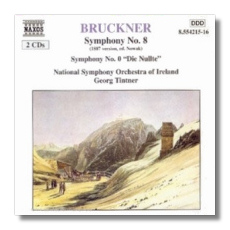
The Internet's Premier Classical Music Source
Related Links
- Bruckner Reviews
- Latest Reviews
- More Reviews
-
By Composer
-
Collections
DVD & Blu-ray
Books
Concert Reviews
Articles/Interviews
Software
Audio
Search Amazon
Recommended Links
Site News
 CD Review
CD Review
Anton Bruckner

Symphonies #8 & 0
- Symphony #0 in D minor (1869)
- Symphony #8 in C minor (1887)
National Symphony Orchestra of Ireland/Georg Tintner
Naxos 8.554215/16
The 8th is one of the most wonderful pieces of symphonic music ever written. This is particularly evident as you compare it with the "0" Symphony by Bruckner. Listening to the first and last completed Bruckner Symphonies is educational. In the "0" you hear all the parts that later cohere more fully in 8. You also hear the seams, like looking at the Frankenstein monster. Okay, maybe it isn't that bad, but you get the idea. While I am glad that I can now add having heard the "0" to my experiences, I am not so sure that it stands on its own. That is, had Bruckner died after writing it, I don't think we'd have any recordings of it at all.
So, now what about the massive 8th? Well, having been impressed almost to hyperbole on hearing Tintner's recordings of the 2nd and 6thsymphonies of Bruckner, I had high expectations. The fact that the recording just misses those expectations may say more about me than this recording. It is the slowest I have heard, two minutes more than Giulini's VPO recording on DG. The Giulini is my favorite 8th along with the very different Schuricht on EMI. While Tintner is slower, you wouldn't guess it from the recordings. Tintner has a pulse, the force, that brings a piece of music alive. I found myself "air-conducting" at many points. I'm always glad when Susan Betz, my wife, doesn't catch me doing this. Anyway, the Tintner is very, very good. Still, the bottom line is that I prefer Giulini. Why? Well, the Vienna Philharmonic is, quite simply, a better orchestra. Bruckner's music benefits from the burnished, rich sound of the VPO. The Irish Orchestra is very good, and Tintner brings out some lovely details, but that last ounce of depth of sound is missing. Speaking of details, Wittgenstein said that God is in them. A Bruckner symphony is probably what he was listening to when he penned those words. Tintner has a way with those details that is magical. The woodwinds and harp constantly delight in this recording. In some instances the slightly thinner sound allows those details to emerge better than on the DG recording.
I don't want to sound negative about this latest installment in Naxos' cycle of Bruckner Symphonies. These are really fine performances and the recording is very good. If you are looking for an introductory experience to the Bruckner 8th, this is it. I would probably recommend the set just so you could add the "0" to your collection. It is interesting to listen to the two side by side.
Copyright © 1999, Robert Stumpf II


















